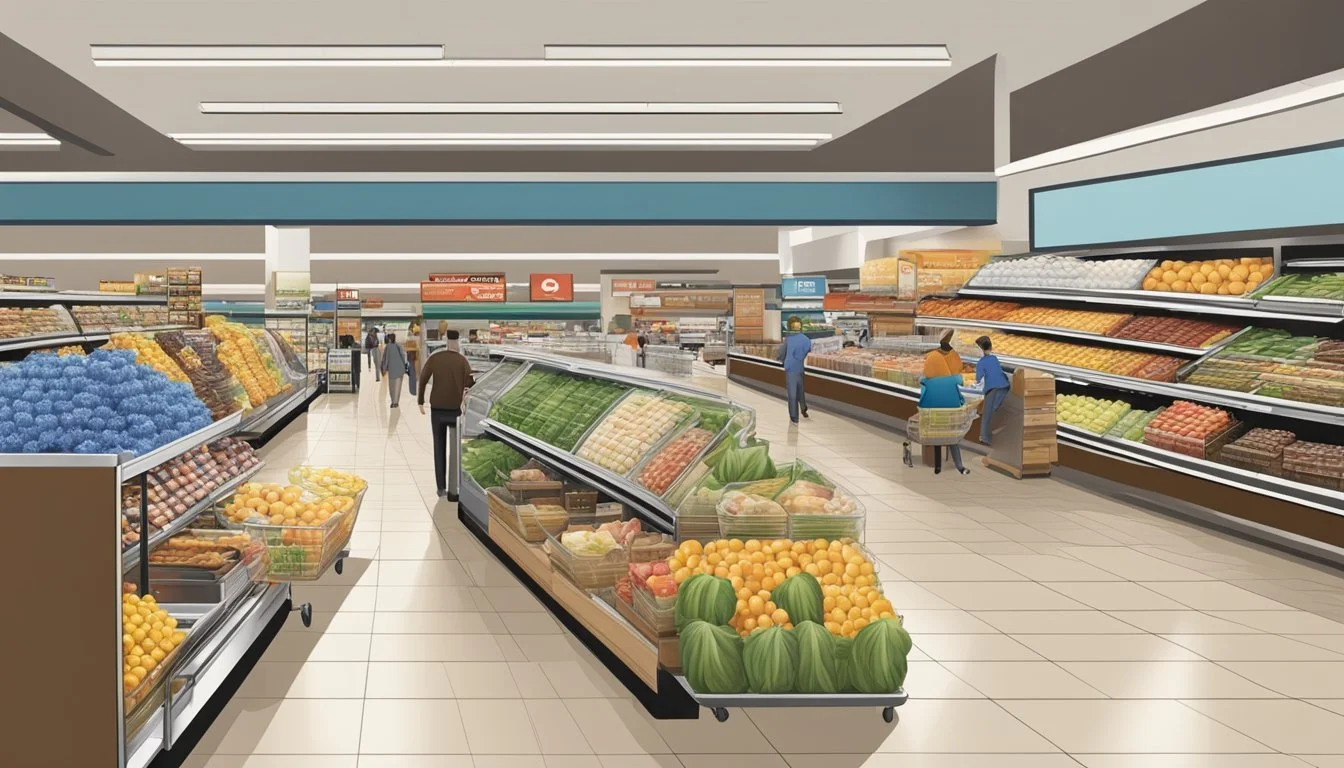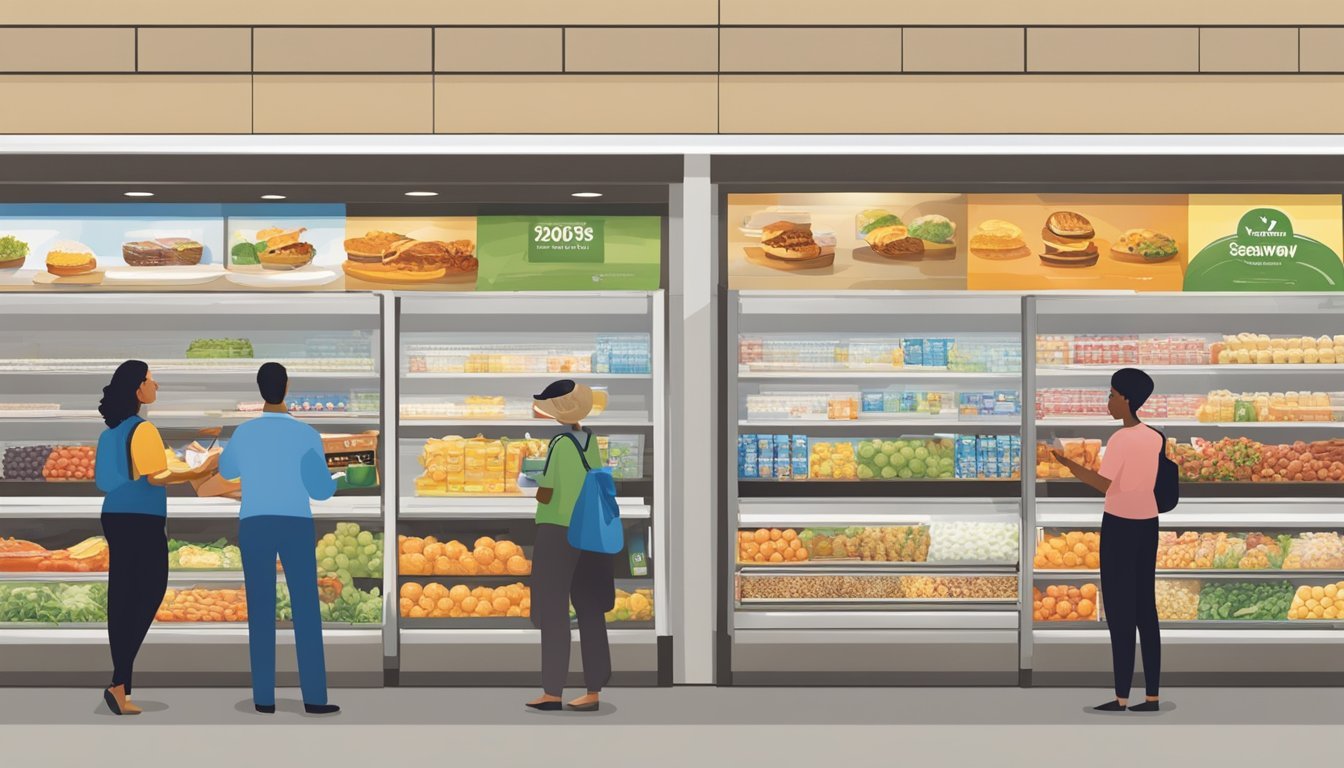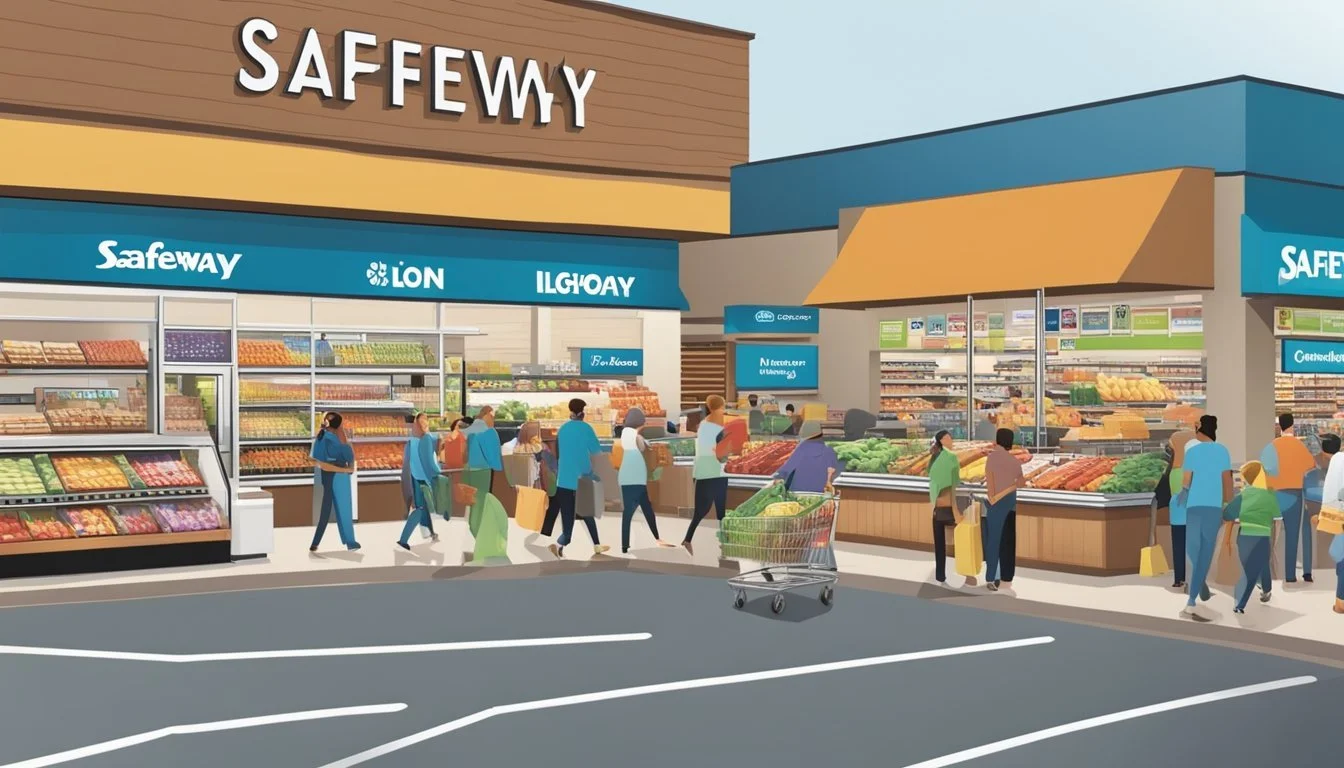Safeway vs Food Lion
Comparing Quality, Prices, and Services
When it comes to grocery shopping, the choice of store can significantly influence both the quality of items purchased and the overall shopping experience. Safeway and Food Lion are two well-known contenders in the supermarket arena, each with their own loyal customer base. They operate a network of stores across various regions, offering a plethora of food products ranging from fresh produce to packaged goods. Both Safeway and Food Lion boast unique features and benefits, but shoppers often find themselves comparing the two to determine which one better suits their grocery needs.
Safeway, with its wide array of branded products, has built a reputation for providing a diverse product selection and a customer-centered shopping ambiance. Its stores are often praised for their clean layouts and helpful staff. Food Lion, on the other hand, is commended for its competitive pricing, especially on staple items such as dairy and bakery products. It appeals to budget-conscious consumers who don't want to compromise on quality for everyday purchases. While Safeway's pricing on branded items may be higher, it offers a shopping experience geared towards those looking for variety and a more upscale environment.
Selecting the "better" grocery store hinges on individual preferences and priorities. For some, the appeal lies in savings and discounts, while for others, the assortment of goods and shopping comfort holds more weight. Each store has its strengths—Safeway shines in its premium offerings and store experience, whereas Food Lion attracts with its wallet-friendly pricing and focus on essential grocery items. Determining which is superior ultimately depends on the shopper's perspective, be it price sensitivity or a preference for shopping experience and variety.
Company Backgrounds
Exploring the historical roots of Safeway and Food Lion reveals the evolution of these grocery chains and their significance in the retail food industry.
History of Safeway
Safeway began its journey in 1915, when M.B. Skaggs purchased a small grocery store from his father in the small town of American Falls, Idaho. With an innovative focus on value for the customer, Safeway grew rapidly. By the 1920s, Skaggs had expanded to 428 stores across the United States. Safeway is noted for being one of the first to implement "sell by" dates on perishables. Today, Safeway operates as a subsidiary of Albertsons and continues to be a major grocery store chain, primarily serving the west and central United States, with a reputation for quality products and customer service.
History of Food Lion
In contrast, Food Lion had its beginnings in 1957 in Salisbury, North Carolina, founded as "Food Town" by Wilson Smith, Ralph Ketner, and Brown Ketner. It distinguished itself by a commitment to keeping prices low. The name was changed to Food Lion in the early 1980s to avoid brand confusion as the company expanded into regions where other chains might have similar names. Acquired by Belgian-based Delhaize Group in 1974, Food Lion has grown substantially, particularly on the East Coast. The chain is well-known for offering affordable prices and has evolved into a significant player in the grocery industry with the goal of delivering quality at lower costs to its customers.
Store Locations and Accessibility
Selecting the right grocery store often comes down to how easily one can access it. Safeway and Food Lion each have distinct patterns of distribution and store locations, catering to different geographical areas.
Safeway's Reach
Safeway operates a significant number of supermarkets across the United States. Specifically, it maintains a strong presence in the western and central parts of the country.
Notable states include:
California: With over 250 stores
Hawaii: Part of the regional stores
Texas
Alaska: Over 25 stores
Safeway’s supermarkets can often be found in both urban and suburban areas, ensuring accessibility for a vast demographic.
Food Lion's Presence
In comparison, Food Lion has a more concentrated presence in the Mid-Atlantic and Southeastern regions of the United States.
The supermarket boasts a robust foothold with:
A strong network of regional stores in these areas
They adeptly serve their communities by offering a multitude of store locations within these regions, making them a convenient option for the local population.
Product Range and Quality
When comparing Safeway and Food Lion, the selection and caliber of products are crucial factors in determining which grocery store comes out on top. Shoppers evaluate these stores based on their ability to offer a wide range of goods as well as how well they meet quality standards.
Variety of Products
Safeway typically offers a more extensive selection of grocery products, including specialty gourmet items that cater to diverse tastes and dietary needs. Customers can find an array of:
Produce: A vast selection of fruits and vegetables, including organic options.
Meat: Various cuts of fresh meat, with options ranging from everyday staples to premium cuts.
Dairy: Full dairy section with multiple brands and alternatives, including lactose-free and plant-based substitutes.
Bakery: An in-house bakery offering fresh bread, cakes, and pastries.
Organic and health-focused products: Well-stocked shelves of organic, gluten-free, and other health-conscious choices.
Food Lion, while not offering as many gourmet products, is focused on delivering essential grocery items at reasonable prices. Their product range includes:
Produce: A selection of fresh produce, though less extensive in variety.
Meat: Affordable options, emphasizing value over premium cuts.
Dairy: Standard dairy offerings covering the bases of milk, cheese, and eggs.
Bakery: Fewer bakery items than Safeway but sufficient for basic needs.
Store brand products: Competitive pricing on Food Lion store brand items.
Quality Standards
Both Safeway and Food Lion have set significant quality standards for their products, ensuring customers receive fresh and safe foods.
Safeway shines with:
Meat Quality: It adheres to rigorous meat selection criteria, often providing USDA Choice cuts and higher.
Fresh Produce: Regularly restocked to maintain freshness, with a noticeable range of organic produce.
Bakery: Its offering of freshly-baked goods made in-store boasts superior quality and taste.
Food Lion maintains its quality through:
Quality Assurance: It enforces strict policies to ensure products meet regulatory and safety standards.
Meat and Produce: While the range may be narrower, the focus is on delivering consistently fresh meat and produce.
Store Brand: Store brand items often match the quality of national brands, offering customers a dependable alternative.
Price Comparison
When considering grocery store options, shoppers often weigh price as a significant factor. Both Safeway and Food Lion offer competitive pricing structures on their products, with variations depending on items and ongoing promotions. This section will scrutinize the pricing differences between the two stores, focusing on everyday prices and available discounts and deals.
Everyday Prices
Food Lion generally presents lower everyday prices on a variety of basic items. For example:
Vanilla Yogurt: Food Lion's 32oz container is priced at $2.49, in contrast to Safeway's Lucerne brand at $3.39.
Milk: A half-gallon of milk at Food Lion costs $2.19, slightly less than Lucerne's half-gallon at $2.29 in Safeway.
Eggs: Shoppers would find a dozen large white eggs at Food Lion for $1.69, compared to $2.49 at Safeway.
This consistent trend solidifies Food Lion's position as a competitive choice for shoppers focused on value.
Discounts and Deals
Both supermarkets run regular promotions, but their strategies differ. Safeway often provides deeper discounts through loyalty programs and personalized deals, which can sometimes beat Food Lion's lower everyday prices. Examples of typical discounts include:
Safeway: Frequent "Buy One Get One Free" offers
Food Lion: Regular discounts, particularly on Food Lion brand items, without the need for a loyalty card.
Food Lion's simplified pricing strategy can be more accessible, as it does not require a membership for its lower prices, while Safeway's discounts and deals typically necessitate participation in their rewards program. Shoppers may find that while Food Lion offers consistent value, Safeway's promotional deals can provide significant savings on specific items when leveraging their loyalty program.
Customer Experience and Services
When comparing Safeway and Food Lion, customer experience and services play a pivotal role. These aspects are crucial as they influence shopping preferences and customer loyalty.
In-Store Shopping Experience
Safeway offers a range of store brands that often match national brand quality but at a more economical price point. Their stores are designed to create a pleasant shopping environment with a focus on offering a wide variety of fresh and healthy options. Food Lion also strives to provide an inviting shopping experience, often highlighting discounts and deals on popular items. They've made efforts to modernize their stores to make them more attractive to customers who prioritize a quick and efficient shopping experience.
Both supermarket chains have adopted health-conscious trends, stocking organic and natural products to cater to health-oriented customers. While not on par with specialized stores like Whole Foods, they offer a competitive selection that rivals mainstream retailers such as Walmart, Target, and Amazon.
Online Shopping and Delivery
Safeway has invested in their online presence, providing a user-friendly platform for customers to shop online. They offer delivery services that compete with leading e-commerce services like Amazon and Walmart, aiming for convenience and time-saving solutions for their customers.
Food Lion, while not as widely recognized for their online shopping platform, they have made strides in improving their online services. They provide options for both delivery and in-store pickup, accommodating the needs of customers who are looking for flexibility and efficient shopping alternatives.
Both supermarkets have been adapting to the digital shift by enhancing their online services to ensure that they keep up with customer expectations in a market that's increasingly influenced by the convenience offered by online retailers.
Brand Reputation and Consumer Perception
Brand reputation and consumer perception are vital aspects that determine the success of a grocery store. They reflect how customers view and interact with supermarkets, influencing their shopping decisions. This section explores how customers perceive Safeway and Food Lion through surveys and market position analysis.
Public Surveys and Reviews
Surveys conducted, such as those by Newsweek, often rank supermarkets based on customer trust. A significant trust factor led to some supermarkets being labeled as "Top 5 Trust Leader" or "Top 10 Trust Leader." In various customer reviews, Safeway has been noted for its wide selection and quality products. However, Food Lion typically emerges as a more cost-effective option, presenting itself as a budget-friendly supermarket without sacrificing quality.
Customer Feedback:
Safeway: Appreciated for variety and product selection.
Food Lion: Praised for better prices.
Market Position
The market position of a grocery store can be determined by how they stack up against each other and against larger chains such as Walmart, Target, and Kroger. Safeway tends to offer a more upscale shopping experience, which can be associated with higher prices but also with a robust selection of products. On the other hand, Food Lion presents a different strategy, focusing on delivering lower prices to its customers.
Comparison Between Stores:
Safeway: Often seen as more expensive than Food Lion.
Food Lion: Lower prices, making it more cost-effective.
Both supermarkets aim to maintain a loyal customer base by aligning with consumer expectations and market demands. Side-by-side comparisons reveal that while Safeway may appeal to those looking for a wider variety, Food Lion caters to budget-conscious shoppers.
Sustainability and Ethical Practices
In the competitive landscape of grocery chains, Safeway and Food Lion exhibit different approaches to sustainability and ethical practices. Consumers interested in these factors might find notable differences between the two stores.
Environmental Initiatives
Safeway has shown a commendable effort towards environmental sustainability. It has been listed repeatedly on sustainability indices including the Dow Jones Sustainability Index and Newsweek's Green Rankings. Safeway's effectiveness in sustainability is also evident with its inclusion in Greenpeace's Supermarket Seafood Sustainability Scorecard.
Plastic Reduction: Efforts include reducing plastic bag usage significantly.
Energy Efficiency: Adoption of renewable energy sources and energy-saving measures in stores.
Waste Management: Comprehensive recycling programs and waste reduction strategies.
Food Lion has taken steps in the sustainability realm but less information is provided regarding comprehensive environmental initiatives comparable to Safeway's documented efforts.
Sourcing and Supply Chain
Both Safeway and Food Lion incorporate ethical sourcing and supply chain practices to various extents, emphasizing the quality and origin of their offerings, especially in relation to meat and produce.
Safeway:
Organic and Healthy Options: A wide range of organic produce and healthy food items.
Meat Quality: Commitments to animal welfare as evident by corporate responsibility programs.
Supply Chain Transparency: Stated efforts to maintain an ethical and transparent supply chain.
Food Lion:
Affordability: Strives to balance affordability with sourcing practices.
Meat and Produce: While specifics are less documented publicly, Food Lion does offer a range of meat and produce, with some emphasis on affordable pricing.
Comparison Conclusion
When evaluating Safeway and Food Lion, consumers will notice distinct differences spanning quality, value, and variety. Safeway exhibits a penchant for carrying a broader range of gourmet items, which may appeal to those with a preference for specialty products.
In terms of value, Food Lion often presents less expensive options. For instance, while Food Lion offers an 18 oz. jar of Skippy peanut butter at a lower price compared to Safeway, shoppers may find Safeway's options to be more diverse.
Here's a succinct price comparison for common items:
Skippy Peanut Butter (18 oz.):
Food Lion: $1.89
Safeway: $2.45
Tide Detergent (100 oz.):
Food Lion: $6.99
Safeway: $8.00
Although Safeway's branded product prices are higher, they often provide in-store promotions and discounts, which can mitigate cost discrepancies. Their loyalty program can also yield savings and personalized deals for frequent shoppers.
Food Lion's position as a solid choice for essential groceries at a reduced cost is clear, which can mean significant annual savings for families. Both supermarkets have their unique merits, but the final choice between Food Lion and Safeway could hinge on individual preferences for cost savings, product variety, or brand availability. Each supermarket caters to different customer priorities, with Food Lion focusing on value and Safeway leaning towards quality and selection.







